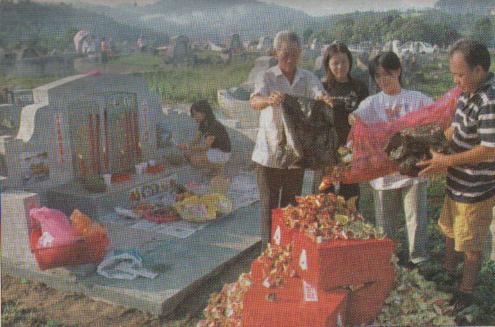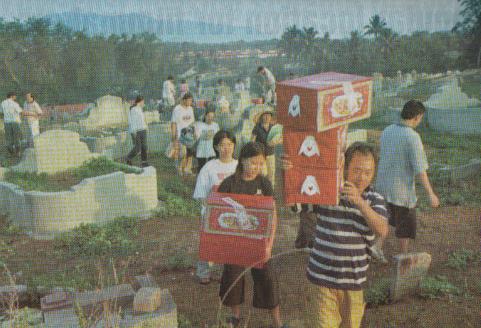
in front of their ancestor's grave at a cemetery.
 FOR THE AFTERLIFE...a couple of family members burning paper money  FILIAL DUTY...the family members carrying paper chests containing reproductions of clothing and basic necessities for their loved ones. |
|
Remembering the departed Ching Ming is a spring festival that marks the onset of planting, rebirth of nature and beginning of outdoor activity. Celebrated two weeks after the vernal equinox, it is also known as Tomb Sweeping Day and is one of the few traditional Chinese holidays that follow the solar calendar, falling on April 4, 5 or 6. In ancient times, the festival was a holiday celebrated by dancing, singing, picnicking and kite-flying. Eggs would be boiled, coloured and then broken to symbolise the release and dispersal of all life. The emperor would plant trees on the palace grounds as symbol of the renewal of spring and as part of the fertility rites. In villages, pine branches, which symbolise long life, would be place in front of the doors of homes. Sprigs of willow were hung under the eaves of homes as symbols of life and as talisman against the forces of darkness. Over the years, this festival has shifted its emphasis on life renewal to a day of focussing on death, quiet solitude and familial closeness to commemorate the departed. The Chinese believe that the dead are connected with life. They believe that the dead are responsible for ensuring fertility in the family and the fields. Sacrifices of food and spirit money are made during spring to appease the ancestors so that the family will be prosperous and reap good harvests. Today, the Chinese visit family graves to pay homage to their departed family members and ancestors. When cleaning and repairing tombs, weeds are pulled out. The family will also offer favourite foods of the deceased and hell currency. Graveside offerings include steamed chicken, roast pork, fruits, steamed rice cakes (fatt koh for prosperity) and wine. After the decease has extracted the "essence" of the meal, the food is shared with family and friends.  |
Ritual of honouring departed loved ones
Homeage can be made ten days before or after the actual date, and those who follow tradition bring along foodstuff, roast pork, poultry and traditional cakes as offering. Joss sticks and candles are also lighted and paper reproductions of clothing, hell banknotes and ingots of folded joss paper are burned for the dead. In line with modern technology, offering nowadays include computers, video-recorders and mobile handphones made of paper. This practice of sending basic necessities, luxury items, mock money and gold and silver ingots to the departed goes back to the days of Confucius who taught that filial sons must not neglect their duties to parents even after they have died. Chinese traditionally chose grave sites according to principles of geomancy from a master whose every instruction must be observed to ensure prosperity when the tombs were built. A visiting family usually arrives with tools to clear the area surrounding the grave of weeds, and then places offerings of food, tea and wine in front of the marble or stone slab bearing the name, birth and death dates of the deceased and, in the cases of immigrants, the names of the villages and province he came from. The burning of incense and candles signal the beginning of the ceremony and, sometimes, firecrackers are lighted. In contrast, those who had been cremated are given offerings of food and gifts in clan houses, temples and homes. |